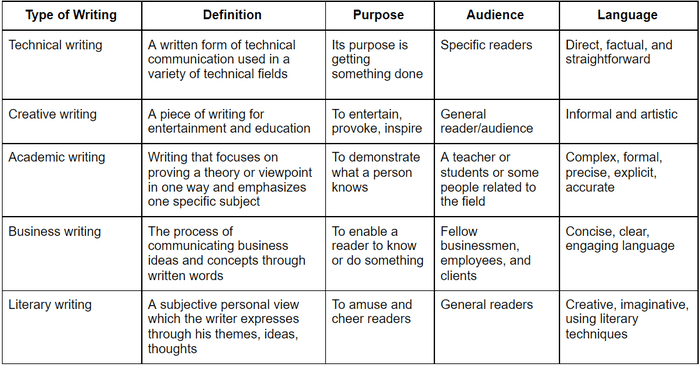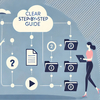
Technical writing is all about the content that focuses on providing detailed and clear information on the product or service. It contains a factual and straightforward message. Technical writers convert complex technical information into useful and easy-to-understand language. You should know that there are different types of technical writing, for example, online tutorials, instruction manuals, API documentation, and so on.
The main idea of all types of technical writing is to help the end-user understand any technical aspect of the product or service.
In addition to technical writing, there are many types of other writings, such as creative, business, and literary writing. All of them have distinctive features. Let’s compare these writings to technical writing and see what they have in common and what makes them different.
Technical Writing vs. Academic Writing
Some people might think these two types of writing are similar. The truth is that these are two completely different categories. It may seem that academic writing should be more complicated since it is focused on some specific and narrow discipline. Indeed, this type of writing may describe very complex concepts and provide specialized knowledge.
Technical writing is intended to describe technical information. It may vary depending on the specifics of a particular industry.
Academic writing is aimed to present a certain point of view on a particular subject. Academic papers show results of research and demonstrate someone’s knowledge. In turn, technical writing explains something to readers and informs them. Technical papers often explain how to use a particular product or service. Technical documents can also describe procedures used by the manufacturer to perform certain tasks. What technical and academic writing have in common is that both types may contain jargon.
Academic and technical writing target different audiences. Academic papers are usually intended for fellow scholars. However, there are also academic pieces of writing intended for a broad audience. Technical writing is intended for people who use a product or service.
Technical Writing vs. Creative Writing
Creative writing is a piece of writing for entertainment and education. It focuses on imaginative and symbolic content, and creative papers are published to entertain, provoke, inspire the user. Technical writing, on the other hand, is not done to amuse its reader. It is used to inform someone. Some technical articles are sometimes made to trigger the reader to take action.
There is no such specific reader who prefers creative papers. Anyone can read the creative paper if they want to, and it gives readers a theme, message, moral, or lesson which is helpful in their real lives or provides temporary entertainment to the reader.
Creative writing has many genres and subgenres. If you want to write creatively, you should have talent. Of course, talent alone is not enough – practice is everything here.
It doesn’t mean that creativity can’t be used in technical writing. Technical articles contain so many facts and data that they can bore and overwhelm readers. This is where creativity in technical writing might come in handy. A tech writer should be creative to encourage their readers to continue reading the document.

Technical Writing vs. Business Writing
Business writing is just about any kind of writing people do at work, if we are not talking about journalism or creative writing. Business writing includes reports, emails, proposals, white papers, minutes, business cases, letters, copywriting, bids, and tenders.
However, many reports, bids, and proposals contain technical data and specifications. So business writers may find themselves editing technical content, and technical writers may be called upon to write persuasive documents for a non-technical audience.
The main objective for both these writings is to inform, be useful, build something or operate the equipment.
The language needs to be clear, concise, and accurate. Wordiness, repetition, and unfamiliar words that the audience may not understand do not belong in either business or technical writing.
Of course, you can use technical jargon in documents where the audience has the same technical background. But too much jargon tends to be a huge problem. So, if in doubt, avoid jargon or explain it.
Some business documents need to be persuasive, whereas technical documents tend to be neutral and objective.
However, there are differences in the content, language, and style of technical and business writing. More on technical writing in business is in our article What Value Technical Writers Bring to Business?
Technical Writing vs. Literary Writing
The main difference between technical writing and literary writing is that literary language is used in literary work while technical writing is used in writing for a particular field. Literary writing is used in fiction. Examples of literary writing include poems, novels, short stories, dramas, etc. The language used in literary writing is creative, imaginative and uses literary techniques like hyperbole, personification, similes, metaphors, etc.
Technical writing is the style of writing that is mostly observed in non-fiction. The language used in technical writing is direct, factual, and straightforward.
Literary writing appeals to emotions. Technical writing appeals to the mind.
Technical writing is aimed at people who have knowledge about a particular subject area. Literary writing is written for general readers.

Conclusion
Every writing style is important in its own way. They are used by writers depending on the subject matter, purpose, language, and target audience. Below is the table that summarizes what you found out about the types of writing mentioned in this article:

It doesn’t matter what you write: essays, business materials, fiction, letters, or just notes in your journal, your writing will be at its best if you stay focused on your purpose and target audience.
Good luck with your technical writing!
ClickHelp Team
Author, host and deliver documentation across platforms and devices


